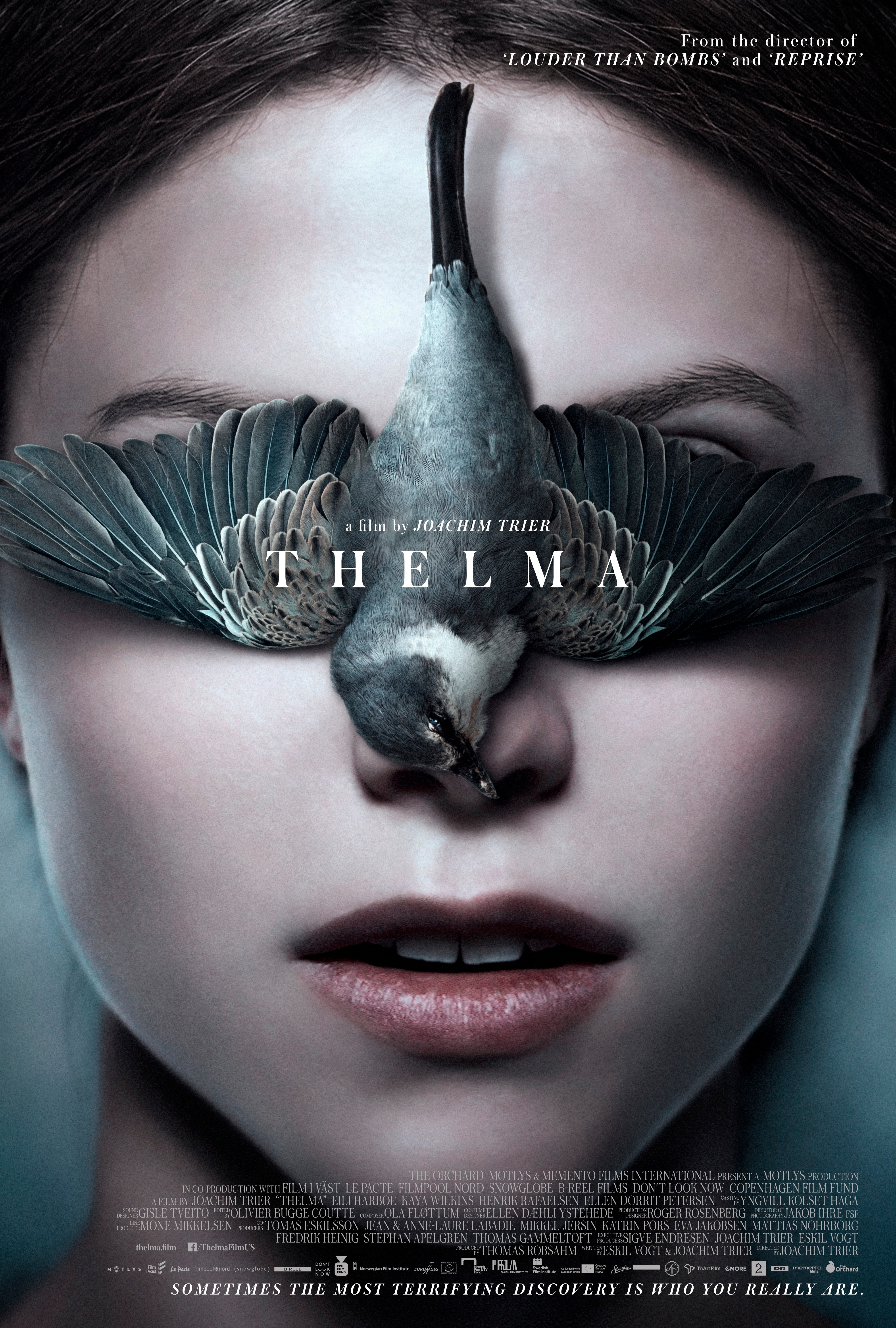
From a wide, overhead vantage, they look almost like insects, scuttling busily across the campus courtyard. Then the camera slowly zooms closer, and one student among many draws the eyes, as surely as Gene Hackman did in the similarly voyeuristic opening minutes of The Conversation. She is Thelma (Eili Harboe), and even from a distance, her body language screams “terrified freshman.” Homeschooled from a young age by her strictly religious parents, Thelma has finally left the isolation and stifling discipline of her family life in Norway’s frigid boonies. But as the predatory glare of that camera conveys, she’ll have to go much further than Oslo to actually escape the supervision of her father, to say nothing of the Father’s all-seeing eyes, always watching from far above.
Thelma knows she’s different—her culture shock, among more socially adept classmates, would register at least a five on the proverbial Richter scale. But she doesn’t really know the half of it until one fateful day at the library, when she suffers a seizure that seems to coincide with a flock of birds descending upon the building. Thelma, as it turns out, is not your ordinary teenage girl, even beyond the severity of her upbringing: Her quaking desire causes actual quakes. What’s the root of these odd occurrences? They seem to stem from her first encounters with the beautiful, confident Anja (Kaya Wilkins), who catches Thelma’s attention in the library, right before her world turns upside down. Stir strange feelings in this sheltered Christian girl and stranger stuff happens.
For writer-director Joachim Trier, this is all a change of pace: a supernatural coming-of-age story of the Raw variety, unfolding in mostly chronological order, albeit with a few flickers of flashback and a couple of dream sequences. Trier, who made the soulful Reprise and Oslo, August 31st—as well as the superb Louder Than Bombs, his English-language debut—is one of the most gifted, underrated filmmakers working today. Stylistically, Thelma is much simpler than those earlier films, which played with time, perspective, and caffeinated montage—with devices sometimes associated with music videos and ’90s-era showboat indies—to open wormholes into the hearts and minds of their characters. What he’s preserved here, minus the formal gymnastics, is a shrewd understanding of youthful yearning. Trier remains precisely attuned to emotional wavelengths; as a queer campus love story, of sorts, Thelma has the right temperament, thanks in part to the nakedly vulnerable performance the director coaxes from his lead. The film charts a whole journey of self-discovery across the topography of her expressive features.
And yet as sensitively as Trier handles his actors, as sensually (and economically) as he lays out his story, this fledging foray into the fantastic—this college Carrie—gets stuck in a peculiar middle ground. It’s at once too metaphorically muddled and too dramatically straightforward. Thelma’s powers clearly represent her deepest, most unconscious desires, the things she hates herself for wanting, and that makes the film a very familiar, even obvious cautionary tale about not repressing who you really are. Thing is, though, Thelma is dangerous. Glimpses of her X-Men origin-story childhood paint the parents, her stern father (Henrik Rafaelsen) and mother (Ellen Dorrit Petersen, who both starred in co-writer Eskil Vogt’s directorial debut, Blind), as oppressive zealots. But aren’t they right to fear, and attempt to contain, a child who can, say, blip someone right out of existence? Shouldn’t Thelma suppress her uncanny abilities? It’s an imperfect, slightly troubling correlative, because sexual orientation isn’t a loaded gun, and encouraging someone to pray the gay away isn’t the same as stopping them from hurting other people.
Thelma looks and sounds great. The score, by Trier’s regular composer, Ola Fløttum, recalls the operatic strains of Howard Shore’s work for David Cronenberg. And speaking of which, one can see flickers of that Canadian director’s Stephen King adaptation, The Dead Zone, which also concerned the burden of impossible “gifts,” in the wintry Norwegian landscape. (Let The Right One In, a cousin of coming-of-age horror, also leaps to mind, though that’s also because this film, like that one, contains some terrible fire effects.) But the film doesn’t really work as a supernatural thriller; it borrows some of the genre’s hoariest conventions—the expositional Google search, the equally expositional trip to the asylum insane—without ever offering much in the way of, well, thrills. Buried in Thelma, beneath its high-concept hook, is a simpler, perceptive, and even touching story about leaving home and trying to find yourself. The first year of college is already a scary, discombobulating twilight zone. Maybe adding uncontrollable superpowers to that experience wasn’t necessary.